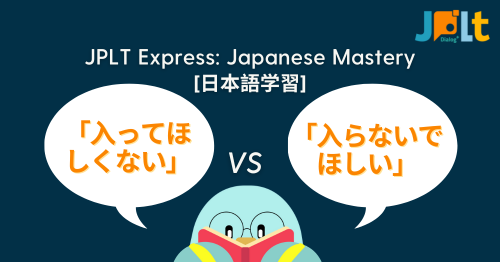[Japanese Language Learning]
What is the Nuance Difference Between “入ってほしくない” [Haitte Hoshikunai] and “入らないでほしい”? [Hairanaide Hoshii]
“I don’t want you to enter there. I want you not to enter there. They seem the same to me…” “In a certain situation, I was told that saying ‘I don’t want you to enter’ was not appropriate…” “Can you explain clearly what the difference is between [入ってほしくない] and [入らないでほしい]?
In this article, Eri from JPLT Online Japanese Language School will thoroughly explain the difference between “入ってほしくない” (Haitte Hoshikunai) and “入らないでほしい” (Hairanaide Hoshii), a frequently asked question by Japanese language learners. Let’s understand the subtle nuances each expression holds!
■ “入ってほしくない” (Haitte Hoshikunai)
“入ってほしくない” expresses the feeling that you don’t want someone to enter, conveying your displeasure or reluctance towards the action. It emphasizes the speaker’s emotions.
Examples:
Regarding your own room:
- 「私の部屋に入ってほしくないです。」(I don’t want you to enter my room.)
Regarding a specific place:
- 「この会議室には子どもたちに入ってほしくない。」(I don’t want children to enter this meeting room.)
■ “入らないでほしい” (Hairanaide Hoshii)
“入らないでほしい” is a request or wish that someone refrains from entering. It strongly emphasizes the intention to stop the other person’s action.
Examples:
Regarding a dangerous place:
- 工事現場に入らないでほしいです。(I want you to stay out of the construction site.)
Regarding a specific time:
- 夜遅くにオフィスに入らないでほしい。(I want you to avoid entering the office late at night.)
■ Specific Differences
- Emotional Emphasis vs. Action Prevention:
- “入ってほしくない” emphasizes your dislike or unwillingness for someone to enter.
- “入らないでほしい” emphasizes a request or intention to prevent the person from entering.
- Different Situational Use:
- Emotional Expression: “入ってほしくない” is used to express your feelings or desires.
- Example: “私は、他の人にこの部屋に入ってほしくないです。” (I don’t want others to enter this room.)
- Specific Request: “入らないでほしい” is used when you specifically want to stop someone from entering.
- Example: “ペットをこの部屋に入らないでほしいです。” (I want you to keep pets out of this room.)
■ Summary
Nuance Differences Between “入ってほしくない” and “入らないでほしい”
Both “入ってほしくない” (Haitte Hoshikunai) and “入らないでほしい” (Hairanaide Hoshii) express a desire for someone not to do something, but their nuances differ. “入ってほしくない” emphasizes your feelings, while “入らないでほしい” indicates a specific request or intention to stop the action. By using them according to the situation, you can communicate your intentions more accurately.





